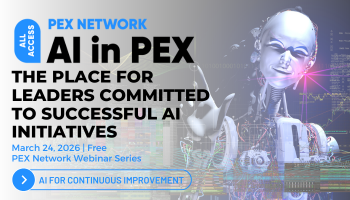AI-augmented framework enhances robotic process automation (RPA) with process mining
Framework aims to ensure that intelligent automation is scalable and adaptable to changing business needs
Add bookmark
A new research paper has proposed a validated, ethically grounded artificial intelligence (AI) augmented framework to enhance robotic process automation (RPA) with process mining.
The framework is designed to ensure that intelligent automation is scalable and adaptable to changing business needs while addressing critical concerns such as data security, workforce transition, ethical governance and organizational adaptability.
The study found that while RPA adoption is rising, scalability is often limited by legacy system incompatibility and lack of automation strategy. AI integration addresses these issues by enabling adaptive learning and contextual understanding.
Join the PEX Network community

Don't miss any news, updates or insider tips from PEX Network by getting them delivered to your inbox. Sign up to our newsletter and join our community of experts.
Learn MoreKey challenges hinder RPA adoption
RPA has emerged as a transformative technology, streamlining repetitive, rule-based tasks across various industries, promising significant gains in operational speed, accuracy and cost reduction, the paper read.
However, despite its growing use, several unresolved issues limit its broader impact and long-term sustainability. These include poor system interoperability, difficulty in scaling and the absence of a unified framework for ethical and secure automation.
“Approximately 60 percent of organizations in our study encountered significant barriers in extending RPA beyond isolated use cases, largely due to incompatible legacy systems and lack of process alignment,” the paper stated.
The study followed a comprehensive, mixed-method approach combining qualitative analysis, quantitative data and AI-integrated experimentation. The objective was not only to evaluate RPA’s technical impact but also to assess its scalability, adaptability and role in workforce transformation.
The study employed a three-stage methodology:
- Stakeholder interviews and surveys. Data was collected from professionals across finance, healthcare, logistics and IT sectors to evaluate existing RPA deployments and identify key challenges.
- Case study analysis. Empirical evaluation of RPA implementations in real-world settings, focusing on operational KPIs before and after automation.
- Simulation modeling. A prototype AI-augmented RPA framework was developed and tested under simulated business conditions to assess adaptability, accuracy and human-machine collaboration potential.
It found that integrating AI and process mining with RPA enhances scalability, efficiency and ethical sustainability, providing superior outcomes compared to conventional rule-based systems.
Register for All Access: AI in Business Transformation 2025!
How does process mining enhance RPA?
Process mining helps organizations map and optimize workflows before automating them, ensuring that the most valuable and repeatable processes are targeted, the paper read. This proactive approach has been shown to increase automation success rates by over 25 percent.
“Process mining, as a diagnostic tool, plays a vital role in preparing workflows for automation, thereby improving effectiveness and reducing fragmentation.”
Process mining can streamline RPA implementation by providing insights into process inefficiencies and bottlenecks. Additionally, advancements in object-centric process mining techniques address the limitations of traditional event logs, offering a more nuanced understanding of complex business processes.
The study also highlighted the importance of transparent communication and fostering a collaborative environment between humans and bots, with organizations investing in these areas experiencing smoother transitions, improved morale and greater productivity.
RPA is not “plug-and-play”
RPA is not a plug-and-play solution for digital transformation, it is a strategic enabler, the paper concluded. “Businesses that pair automation with intelligent technologies, align processes through mining tools and empower their workforce through inclusive change management will be best positioned for long-term success.”
All Access: AI in Process Excellence 2026

Don’t get left behind. Join us at All Access: AI in Process Excellence to learn from leading experts, thought leaders, and practitioners who are on the ground experimenting, researching, and learning how to best use AI. They will share their secrets with you for free. And you’ll have the opportunity to network with fellow professionals as we navigate this new world. Register now to save your spot.
Register Now












